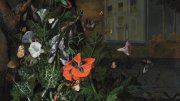Carol Ochs is looking for a story, possibly titled “Learning Day,” from a 1953 science-fiction magazine, in which all children have a chip implanted that enables them to read. They do, briefly, but only the hero continues reading. Later, they are programmed for their professions. The hero, eager to become a computer programmer, is devastated when told he will not be programmed and will have no profession. He and a few other unprogrammed people live in a pleasant cottage and read. He then goes to the Olympics of computer programming, where a former rival is missing a part and loses. The hero eventually realizes that all the others failed programming day and only those not programmed were free to think.
Update: A lead provided by E.J. Barnes, who recalled hearing of an Isaac Asimov story similar to the description above, led (courtesy of Google and Wikipedia) to the identification of “Profession,” a novella by Asimov. Published originally in the July 1957 issue of Astounding Science Fiction, it was subsequently reprinted in the author’s 1959 collection Nine Tomorrows: Tales of the Near Future. Barrie Greene provided a link to the text itself.
“red Coke can in the snow” (July-August). Valerie Brader suggested in reply “the beginning of chapter 33 of Expecting Adam, by Martha Beck [’85, Ph.D. ’94], in which she thinks a pink gleam on the ground near the Charles River is rose quartz, but finds it is styrofoam. She wonders if she is ‘robbing myself of beauty with my own cognitive prejudice.’” But Charles Hayford, noting that Beck’s book appeared well after he began looking for a citation for the anecdote, which took place on the West Coast and “had a Zen element,” hopes for other leads.
Send inquiries and answers to “Chapter and Verse,” Harvard Magazine, 7 Ware Street, Cambridge 02138, or via e-mail to chapterandverse@harvardmag.com.








